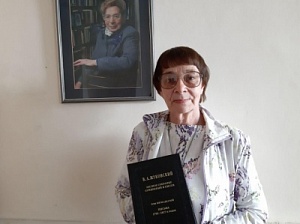TSU philologists have published the 15th volume of the Vasily Andreyevich Zhukovsky collected edition. It includes 355 letters of the great poet to 49 addressees for the years 1795-1817, among whom are close relatives of Zhukovsky – his mother, stepsisters, and nieces; literary friends K.N. Batyushkov, P.A. Vyazemsky, A.F. Voeikov, N.I. Gnedich, G.R. Derzhavin, I.I. Dmitriev, and N.M. Karamzin; and members of the imperial family - Alexander I, Empress Maria Feodorovna, and Grand Duke Nikolai Pavlovich. More than 80 letters were published for the first time.
The Faculty of Philology is engaged in publishing the complete works of Zhukovsky – this is its attempt to bring together all the creative heritage of the poet and translator. This is a unique case in world practice because usually such work is carried out by academic institutions and not university scientists. Now the group of researchers has already released 14 volumes of essays and diaries; there remain six, which will include about 3,000 letters of Vasily Andreyevich Zhukovsky. Before the publication of the collected edition, science knew only about 1,000 letters from him.
- The 15th volume contains the earliest, children’s, letters to his mother – 1795 and ending in 1817, the last year of his civil liberty, when he was without service, without a place, was only a poet,- said Olga Lebedeva, professor at the Faculty of Philology. - These letters are mainly associated with his literary debut and with his closely related, friendly circle. A particularly impressive cycle, letters from 1814 to 1817, telling about his tragic love for Masha Protasova, is just a heartbreaking reading. In these letters, the history of the formation of Zhukovsky as a poet and as a man of good morals is obvious.
In the process of the work, the scientists are constantly finding new letters. The philologists are looking for material in the archives of Moscow and Saint Petersburg, in periodicals of the 19th – 20th centuries, and in collections of Zhukovsky’s works of the 19th-20th centuries. For example, Zhukovsky's correspondence with artists was discovered, when he helped to formation the Hermitage collections and about 50 letters to European artists about the purchases of their works were preserved.
In addition, many letters are located abroad. For example, a colleague from Italy published the letters of Vasily Andreyevich to Antonio Odescalchi, who was Zhukovsky’s guide in Northern Italy. In Naples, there was a letter connected with the death of the poet’s niece, Alexandra Voeikova. In Germany, there is a publication of letters addressed to the Prussian king Frederick William IV. According to Tomsk philologists, there are probably letters in France, because in 1827 Zhukovsky spent 2 months in Paris, and he had a wide circle of acquaintances with whom he corresponded. Perhaps there are letters in Switzerland, where Cecilia Wildermet, the governess of Empress Alexandra Feodorovna, lived, with whom Zhukovsky was friends.
There are a lot of letters and there are constantly new ones, so scientists plan to make an application that will include the letters found in the process of preparing the collected editions and not included in the corresponding volumes.
- Details that make the classics alive are read from letters and diaries. Yury Mikhailovich Lotman has a remarkable idea that the type of personality was the main cultural heritage of the golden age of Russian culture, - said Olga Lebedeva. - These are people who were formed at the turn of the 18th-19thcenturies, in the so-called period of the nobility of Russian culture. This is a universal personality type of Russian cultural figures: the high ideal of a Russian person, organically inscribed in the European cultural context, a citizen of the world and, at the same time, an ardent patriot of Russia.
In 2019, in the 16th volume, philologists plan to publish more than 150 previously unknown letters of V.A. Zhukovsky.

